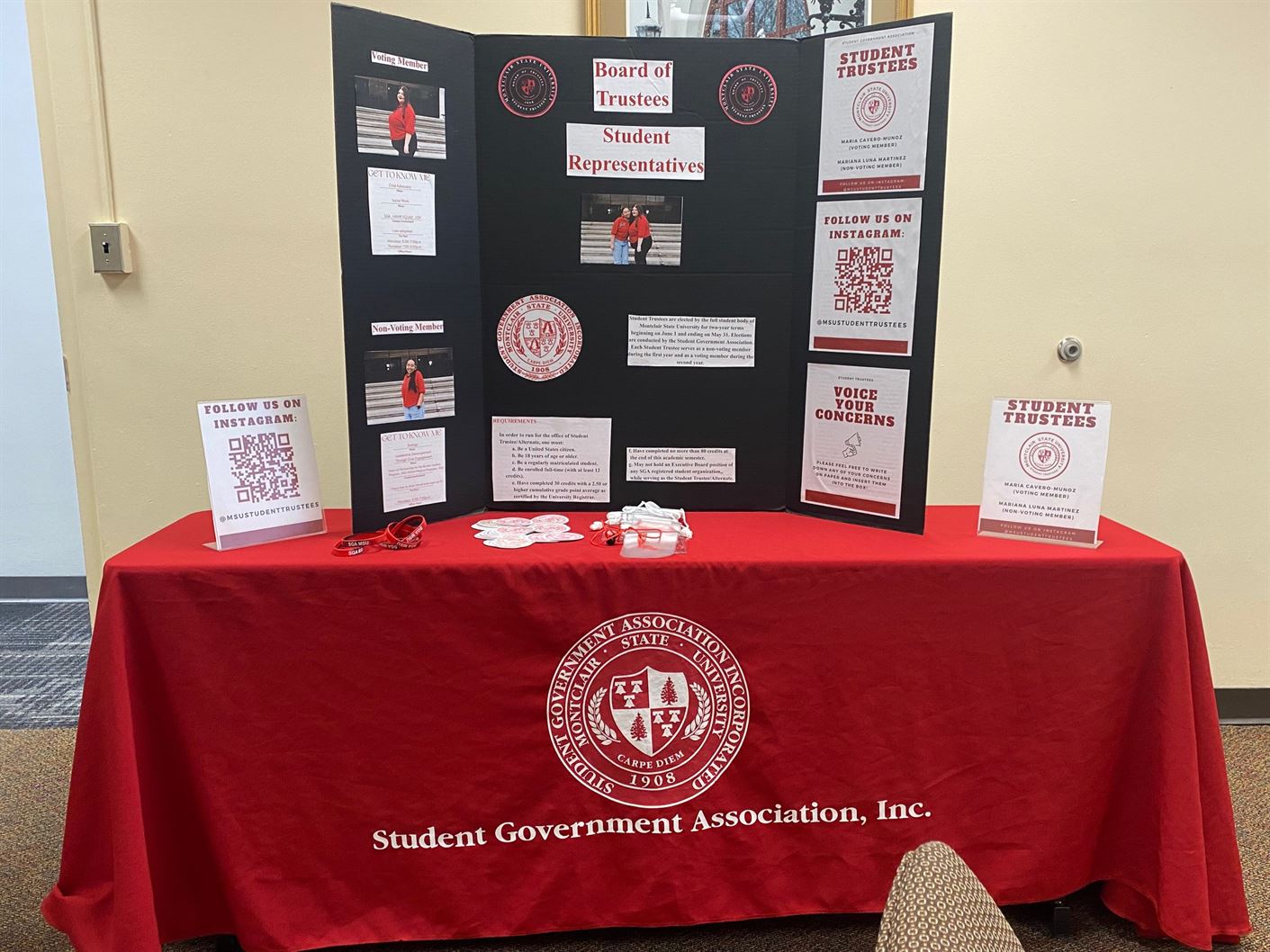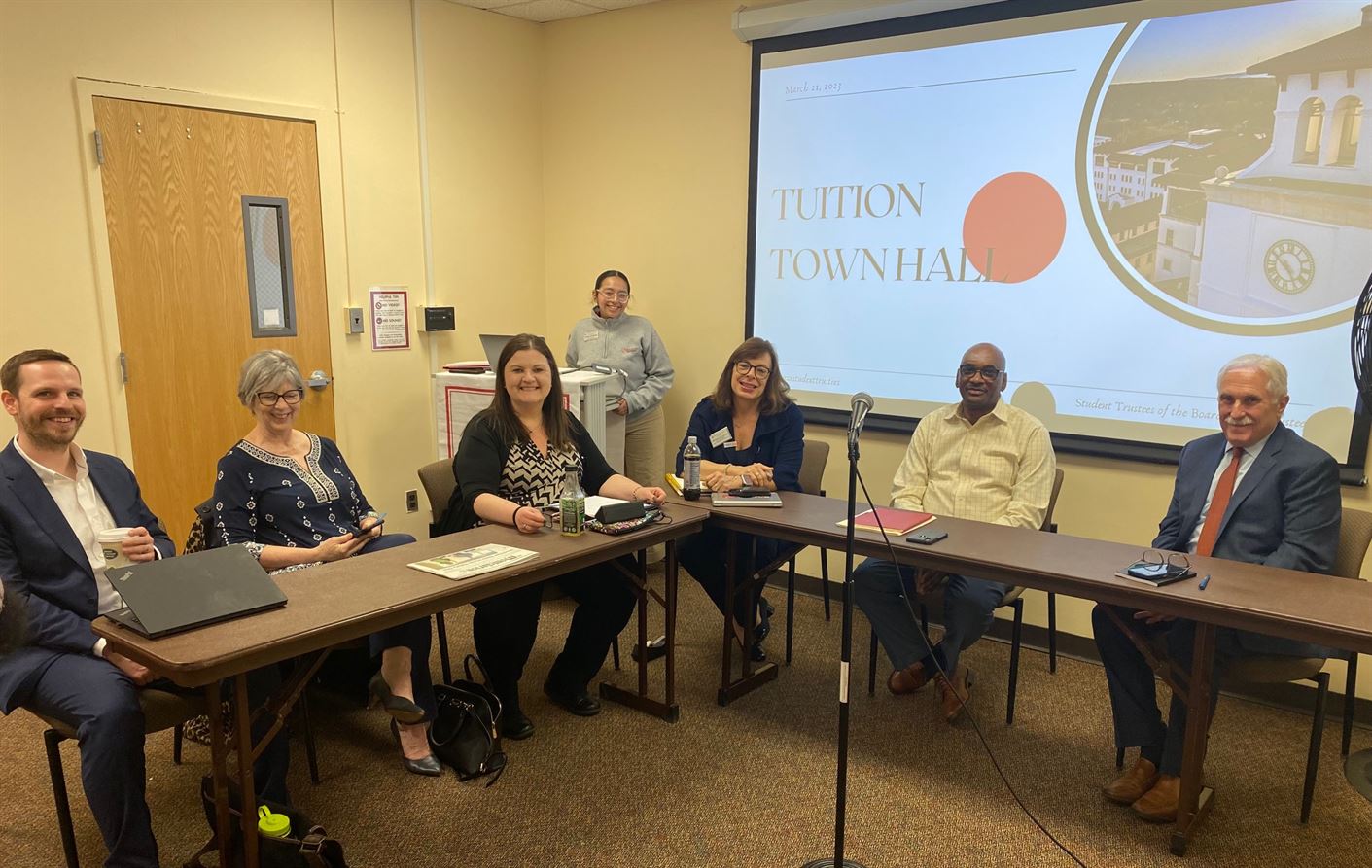The Board of Trustees held a student hearing for tuition.
Mariana Luna-Martinez and Maria Cavero Munoz serve on Montclair State University’s Board of Trustees as student trustees. They are the student voices of the board.

At the listening session, the student trustees displayed their bios, contact information and future events.
Kamil Santana | The Montclarion
This past Thursday, Luna-Martinez, the non-voting student trustee, moderated the tuition listening session at the Student Center.
A panel of directors from various campus services were there to answer questions students had. The directors of financial aid, auxiliary services, budget and planning and residence life, the vice president of student development and campus life and the associate dean of students were in attendance.
Only two students attended the session but Luna-Martinez and her student trustee partner, voting member Cavero Munoz, composed general questions for the panel prior to the session.
Cavero-Munoz, the voting member, was not able to attend the listening session.
Tuition could possibly increase by two to four percent for the next academic year and will be voted on by the Board of Trustees at the tuition hearing this Friday, March 31 at the 7th floor Conference Center at University Hall. The hearing will begin at 11:30 a.m.
Students are welcome to attend the meeting to voice their concerns to the Board of Trustees.
Luna-Martinez explained the importance of the tuition listening session.
“[I] hosted our tuition town hall listening session to see what students are saying, what students are asking and they had the opportunity to ask different people from different departments,” Luna-Martinez said. “These departments play a role and they want to make sure that they’re meeting the needs of students because students are everyone’s number one priority here at Montclair State.”

Mariana Luna-Martinez is the non-voting student trustee. She encourages students to voice their concerns as many have been resolved lately.
Kamil Santana | The Montclarion
Along with the possible tuition increase, students who receive the Federal Pell Grant will see an increase in aid later this year according to Jim Anderson, director of financial aid.
“The Federal Pell Grant program will have an increase for this coming fall,” Anderson said. “So students who are receiving the maximum Pell Grant will get a $500 increase over last year. And for students who are getting the New Jersey Tuition Aid Grant, TAG, we don’t know the amounts yet.”
Hearing that the tuition may increase may be daunting news for students, but the panel assured students that despite the increase, they are trying to keep tuition and other services affordable. With the uncertainty of the global economy’s state, the university has been trying to increase costs incrementally.
Dawn Soufleris, vice president for student development and campus life, said that in comparison to other state schools, Montclair State tuition rates are low.
“I think we work very hard to keep costs to the lowest level we can, understanding that there are other factors: [the] cost of living and services and food costs and labor,” Soufleris said. “Those other things do go into and are factored when we look at what the pricing of things are going to be but we try to keep it as low as we can so that we can help our students.”
The leaders of other departments discussed rising costs and services students may need that they were not aware of.
Jim Robinson, director of auxiliary services, said that because the cost of food is going up, dining prices will increase.
“It would vary, obviously based on the product,” Robinson said. “We have a new dining services provider coming on July 1 and they proposed several changes and a lot of flexibility in the student meal plan.”
Melissa Ginotti, associate vice president of auxiliary services, added that dining prices will not increase dramatically.
“The cost of the food for the providers is going up eight to 10 percent,” Ginotti said. “Our meal plan rates for students are not going to go up by that significant of an increase. It will be much smaller.”
Ginotti also announced that a potential virtual bookstore is in the works to make textbooks more accessible at reasonable prices for students.
“We are excited about the opportunity that we’re going to be exploring to bring in a new bookstore experience to the campus,” Ginotti said. “So we’re going to be going out to bid on that in the next couple of months. So the end goal is clearly that we are looking to reduce the cost of textbooks as much as possible for students.”
Jeanine Stroh, executive director of residence life, said housing rates will be rising.
“We try very hard to do an assessment every year to see what our schools within New Jersey are charging for housing and we try to make sure that we are not putting our rates up too much because we understand the needs of the students,” Stroh said. “We want to meet their needs in terms of what we provide, but we also want to make sure we’re not charging them too much money in the end. So we’re looking at about a two percent increase this year. [We’re] just trying to keep up with the cost of services.”
Kevin Andreano, acting director of budget and planning, said the university is trying its best to keep attending the institution affordable and provide students with the help they need. Tuition increases affect the operations of the university.
“Basically when we raise tuition, most of our tuition increase goes right into contractual obligations for our faculty and staff,” Andreano said. “We try to keep those costs as low as possible and make things as affordable as possible. We’re trying to be as efficient as possible. It is challenging to find that balance of keeping the tuition increase as low as possible when we have inflation far exceeding the rates that we’re increasing and when we have labor costs exceeding the rates. We’re increasing tuition and we’re also trying to make sure that we’re keeping pace and providing aid at a reasonable rate.”
Fatima deCarvalho, senior associate dean of students, brought awareness to the services students may need in an emergency situation and the resources available to aid financially.
“We have emergency funds available,” deCarvalho said. “Some based on need and some based on circumstances. So I work very closely with [Anderson] and members of his staff to kind of figure that out. Sometimes students need emergency housing. I’ll work with residence life and figure out if there’s some grant money that we can provide that student to get them through that period of time. We have a student support [services case] manager, Arian Craig. [She] is a licensed social worker and the beauty about having someone with her skill set is that she has an understanding of some of the opportunities outside of the university and within the state.”
Anderson concluded with advice to students about financial aid deadlines.
“By now, all students who are planning to return next fall should have filed their FAFSA for the 2023-2024 academic year,” Anderson said. “For students getting the New Jersey tuition aid grant or TAG, there’s a hard deadline of April 15. And if they missed the deadline, they lose their fall grant. No recourse to that, no appeal or anything like that.”
Anderson also announced a new aid program for juniors and seniors called the Garden State Guarantee.
“It’s a program that is restricted to students who are juniors or seniors,” Anderson said. “And that’s defined by the number of credits they have. So they have to have 60 credits to be considered a junior and 90 credits to be considered a senior. They can’t have more than 128 credits. In the case of an independent student, they’re looking at their income and their spouse if they’re married and if the family income is $65,000 or less then they would qualify based on the income requirements. In that instance, the student is assured that their tuition fees will be covered in full by what we call gift aid, which is grants and scholarships.”
Daniel Ramos, a junior biology and computer science major, said he might attend the tuition hearing on Friday. Ramos said he expected the increase in tuition.
“I don’t really get aid so it kind of sucks to have to pay more now,” Ramos said. “I didn’t really think about it because I came in knowing that it was going to go up a little bit every year.”
Tanner Rivera is a junior exercise science major. She said this past year’s tuition aid did not help her fully cover tuition expenses and an increase in tuition affects her as a commuter.
“I think we already have to pay for parking, especially as a commuter it’s expensive for parking,” Rivera said. “On top of parking, you have to get a permit and [they don’t] have permits for all the commuters. They raised the price. It’s frustrating because there are others, not just me, that have bills to pay and other expenses. I got shorted out of financial aid this past year. So now I have to pay $500 for the last two semesters, which comes to over $1,000, which isn’t terrible but still if I had the financial aid I had, I would be okay.”

Tanner Rivera is upset about the tuition increase as it affects other services. She says that as a commuter, parking is getting expensive and making it hard for her to keep up.
Kamil Santana | The Montclarion
Wanjin Zhang, a freshman business administration major, said despite the increase in tuition, students who receive financial aid have good news that aid is increasing.
“I think it’s good because, with the financial aid, students that actually need help paying for their tuition are getting an increase in their financial aid,” Zhang said.

Wanjin Zhang is glad that financial aid is increasing for those who need it.
Kamil Santana | The Montclarion



